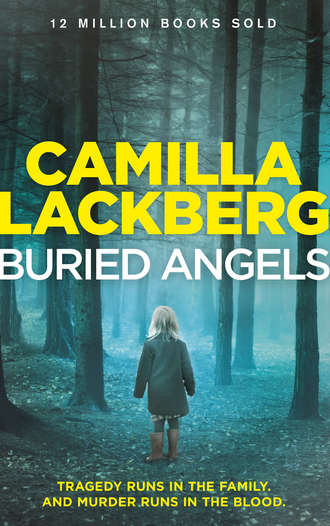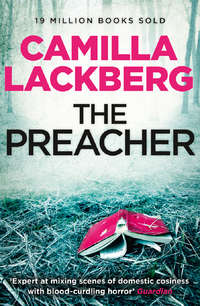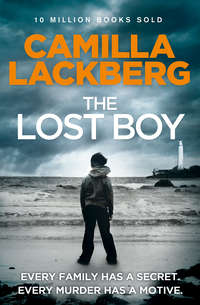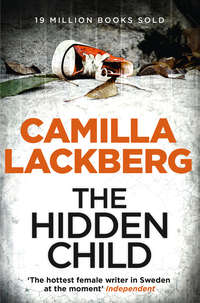
Полная версия
Buried Angels

CAMILLA LACKBERG
Buried Angels
Translated from the Swedish by Tiina Nunnally

Copyright
HarperCollinsPublishers
1 London Bridge Street
London SE1 9GF
www.harpercollins.co.uk
Published by HarperCollinsPublishers 2014
Copyright © Camilla Lackberg 2011
Published by agreement with Nordin Agency, Sweden
Translation copyright © Tiina Nunnally 2014
Cover design layout © HarperCollinsPublishers 2014
Cover photographs © Tony Watson / Arcangel Images (forest); Johner Images / Getty Images (girl)
Camilla Lackberg asserts the moral right to be identified as the author of this work.
A catalogue record for this book is available from the British Library.
This novel is entirely a work of fiction. The names, characters and incidents portrayed in it are the work of the author’s imagination. Any resemblance to actual persons, living or dead, events or localities is entirely coincidental.
All rights reserved under International and Pan-American Copyright Conventions. By payment of the required fees, you have been granted the non-exclusive, non-transferable right to access and read the text of this e-book on-screen. No part of this text may be reproduced, transmitted, down-loaded, decompiled, reverse engineered, or stored in or introduced into any information storage and retrieval system, in any form or by any means, whether electronic or mechanical, now known or hereinafter invented, without the express written permission of HarperCollins.
HarperCollinsPublishers has made every reasonable effort to ensure that any picture content and written content in this ebook has been included or removed in accordance with the contractual and technological constraints in operation at the time of publication.
Source ISBN: 9780007419593
Ebook Edition © DECEMBER 2014 ISBN: 9780007419609
Version 2018-09-24
‘If one man can display so much hatred, imagine how much love all of us together could show.’
Table of Contents
Cover
Title Page
Copyright
Epigraph
Chapter One
Fjällbacka 1908
Chapter Two
Fjällbacka 1912
Chapter Three
Fjällbacka 1915
Chapter Four
Fjällbacka 1919
Chapter Five
Fjällbacka 1919
Chapter Six
Fjällbacka 1919
Chapter Seven
Fjällbacka 1919
Chapter Eight
Fjällbacka 1920
Chapter Nine
Fjällbacka 1925
Chapter Ten
Stockholm 1925
Chapter Eleven
Stockholm 1925
Chapter Twelve
Stockholm 1925
Chapter Thirteen
Långbro Hospital 1925
Chapter Fourteen
Fjällbacka 1929
Chapter Fifteen
Fjällbacka 1931
Chapter Sixteen
Lovö Cemetery 1933
Chapter Seventeen
St Jörgen Hospital 1936
Chapter Eighteen
Fjällbacka 1939
Chapter Nineteen
The Karinhall Estate 1949
Chapter Twenty
Fjällbacka 1951
Chapter Twenty-One
Fjällbacka 1961
Chapter Twenty-Two
Fjällbacka 1970
Chapter Twenty-Three
Valö 1972
Chapter Twenty-Four
Valö 1973
Chapter Twenty-Five
Valö 1974
Chapter Twenty-Six
Valö, Easter Eve 1974
Chapter Twenty-Seven
Valö, Easter Eve 1974
Chapter Twenty-Eight
Stockholm 1991
Afterword
About the Author
Also by Camilla Lackberg
About the Publisher
Chapter One

They had decided to renovate their way out of the grief. Neither of them was sure it was a good plan, but it was the only one they had. The alternative was to lie down and slowly pine away.
Ebba ran the scraper over the outside wall of the house. The paint was coming away easily. It had already started to flake off in big chunks, so all she had to do was help it along. The July sun was so hot that her fringe was sticking to her forehead, which was damp with sweat, and her arm ached because it was the third day in a row she’d carried out this same monotonous, up-and-down motion. But she welcomed the physical pain. The worse it got, the more it muted the ache in her heart, at least for a while.
She turned around and looked at Tobias, who was working on the lawn in front of the house, sawing boards. He seemed to sense that she was watching him, because he glanced up and raised a hand in greeting, as if she were an acquaintance he was meeting on the street. Ebba felt her own hand respond with the same awkward gesture.
More than six months had passed since their life had been shattered, but they still didn’t know how to react to each other. Every night they would lie in the double bed with their backs turned, terrified that some involuntary touch might release something that they wouldn’t know how to handle. It was as if the grief filled them to the point there was no room for any other feelings. No love, no warmth, no empathy.
Guilt, heavy and unexpressed, separated them. Things would have been easier if they could have defined it and worked out where it belonged. But it kept shifting back and forth, changing strength and shape, constantly attacking from new directions.
Ebba turned back to the house and continued scraping at the wall. Under her hands the white paint came off in big pieces, revealing the wooden boards underneath. She stroked the wood with her free hand. This house seemed to have a soul in a way that she’d never noticed anywhere else. The small terraced cottage in Göteborg had been almost new when she and Tobias had bought it together. Back then she had loved the fact that the whole place had shone so brightly, that it was so untouched. Now all of that newness was a thing of the past, and this old house with all its flaws was better suited to her present state. She thought again about the leaky roof, the boiler that regularly needed a good kick to get it started, and the draughty windows that made it impossible to keep a lighted candle on the windowsill. Rain and wind also swept through her soul, mercilessly blowing out the candles that she tried to light.
Maybe her spirit would be able to heal here on Valö. She had no memories from this place, and yet it was as if they knew each other, she and this island. It was just opposite Fjällbacka. If she went down to the dock, she could see the small coastal town spread out across the water. At the base of the steep granite cliff the little white buildings and red boathouses were lined up like a string of beads. The sight was so beautiful that it almost hurt.
Sweat was running down her forehead, stinging her eyes. She wiped her face on her T-shirt and squinted up at the sun. Seagulls were circling overhead. The birds called and shrieked to each other, their cries mixing with the sound of motorboats moving through the strait. She closed her eyes and let the sounds carry her away. Away from herself, away from …
‘How about taking a break to go swimming?’
Tobias’s voice broke through the background noise, startling her. She shook her head in confusion, but then nodded.
‘Sure, let’s do that,’ she said, climbing down from the scaffolding.
Their bathing suits had been hung up to dry in back of the house. Ebba peeled off her sweaty work clothes to put on a bikini.
Tobias was faster, and he waited for her impatiently.
‘Ready?’ he said and then led the way down the path to the beach. The island was quite large and not as barren as many of the smaller islands in the archipelago of Bohuslän. The path was lined by leafy trees and tall grass, and Ebba stomped hard on the ground as she walked along. She had an intense fear of snakes, which had grown worse since she saw a viper basking in the sun a few days ago.
As they started down the slope towards the water, she couldn’t help thinking about how many children’s feet had walked this path over the years. The place was still called the summer camp, even though it hadn’t been a summer camp for children since the 1930s.
‘Watch your step,’ said Tobias, pointing to several tree roots sticking up from the ground.
His concern, which should have warmed her heart, felt almost suffocating, and she made an exaggerated effort to avoid the roots. After another few metres, she felt rough sand under her feet. Waves were lapping the long shoreline, and she tossed her towel on to the beach and walked right into the salty water. Seaweed rubbed against her legs and the sudden cold made her gasp for breath, but she quickly adapted to the chill. Behind her she could hear Tobias calling her name. Pretending not to hear, she kept on going. When the bottom fell away beneath her, she started swimming, and with only a few strokes she reached the bathing platform anchored a short distance from shore.
‘Ebba!’ Tobias shouted from the beach, but she continued to ignore him and grabbed hold of the ladder. She needed some time to herself. If she lay down and closed her eyes, she could pretend that she was shipwrecked out on the wide open sea. Alone. With no need to pay attention to anyone else.
She heard him ploughing through the water, getting closer. The bathing platform rocked as Tobias climbed up, and she squeezed her eyes tighter in order to shut him out a little longer. She wanted to be alone, by herself. Not the way things were now. She and Tobias were both alone, but together. Reluctantly she opened her eyes.
Erica was sitting at the table in the living room, which looked as if a bomb had blown toys all over the room. Cars, dolls, stuffed animals and dress-up clothes were scattered everywhere. Three children, all under the age of four, were the primary reason why the house looked as it did. But now that she had some time to herself without the children, she had, as usual, given priority to her writing instead of tidying up the house.
When she heard the front door open, she glanced up from her computer and caught sight of her husband.
‘Hi. What are you doing here? Weren’t you going over to see Kristina?’
‘Mamma wasn’t home. Typical. I should have called first,’ said Patrik, kicking off his Crocs.
‘Do you really have to wear those things? How can you drive with them on?’ She pointed at the loathsome footwear which, to top it off, were a neon green. Her sister Anna had given them to Patrik as a joke, but now he refused to wear anything else.
Patrik came over to her and gave her a kiss. ‘You’re so beautiful,’ he said, and then headed for the kitchen. ‘Did the publishing house get hold of you, by the way? It must have been important – they even tried my mobile.’
‘They wanted to know if I could attend the book fair this year, as I promised. I still can’t make up my mind.’
‘Of course you must go. I’ll take care of the kids that weekend. I’ve already made arrangements to take those days off.’
‘Thanks,’ said Erica, but in her heart she was irritated with herself for feeling so grateful to her husband. After all, didn’t she always have to take over when his work called him away at a moment’s notice, or when their weekends, holidays, and evenings were interrupted because his job couldn’t wait? She loved Patrik more than anything, but sometimes it felt like he hardly noticed that she had to bear most of the responsibility for their home and the children. She had a career too, and quite a successful one at that.
She often heard people say how amazing it must be to make a living as a writer. To be in charge of her own schedule, to be her own boss. That always annoyed Erica. Much as she loved her work and realized how fortunate she was, it wasn’t as easy as everyone seemed to think. Freedom was not something she associated with being an author. On the contrary, when she was writing, it consumed her 24/7. Sometimes she was envious of people who went off to work, put in their eight hours, and left it all behind them as soon as they set off home. She could never put her work aside, and with success came demands and expectations that had to be combined with her life as the mother of young children.
But it was hard to claim that her work was more important than Patrik’s. He protected people, solved crimes, and helped to make society function better, while she wrote books that were read as entertainment. So she put up with the fact that she was usually the one who drew the short straw, even though it sometimes made her feel like screaming.
With a sigh she got up and went to join her husband in the kitchen.
‘Are they asleep?’ asked Patrik, taking out the fixings for his favourite sandwich: flatbread, butter, caviar, and cheese.
Erica shuddered, knowing his next step would be to dunk the sandwich in a cup of hot chocolate.
‘Yes, for once I managed to get them to take a nap at the same time. They had a good play session this morning, so all three of them were worn out.’
‘Great,’ said Patrik, sitting down at the kitchen table to eat.
Erica went back to the living room to fit in a little more writing before the children woke up. Stolen hours. That was all she could count on these days.
She was dreaming of fire. Horror etched on his face, Vincent was pressing his nose against the windowpane. Behind him she saw the flames shoot up, higher and higher. They were getting closer to him, singeing his blond locks as he screamed soundlessly. She wanted to throw herself at the glass, shattering it so she could rescue him from the flames that threatened to engulf him. But no matter how she tried, her body refused to obey.
Then she heard Tobias’s voice. It was filled with reproach. He hated her because she couldn’t save Vincent, because she was standing there watching as he was burned alive right before their eyes.
‘Ebba! Ebba!’
His voice made her try again. She had to run forward and break the glass. She had to …
‘Ebba, wake up!’
Someone was tugging at her shoulders and forcing her to sit up. Slowly the dream faded. She wanted to hold on to it, throw herself into the flames, and maybe for one brief moment hold Vincent’s little body in her arms before they both perished.
‘You have to wake up. Fire!’
Suddenly she was fully awake. The smell of smoke prickled her nostrils, making her cough so hard that her throat hurt. When she looked up she saw that smoke was billowing through the doorway.
‘We have to get out!’ shouted Tobias. ‘Crawl underneath the smoke. I’ll follow you. I’m going to see if I can put out the fire.’
Ebba rolled out of bed and dropped to the floor. She could feel the heat of the floorboards against her cheek. Her lungs were burning, and she felt so terribly tired. How could she possibly manage to move? She wanted to surrender, to sleep. She shut her eyes and felt a heavy lethargy spread through her body. She would rest here for a moment. Just sleep for a while.
‘Get up! You have to get up!’ Tobias’s voice was shrill, rousing her from her torpor. He wasn’t usually scared of anything. Now he was yanking on her arm, hauling her on to all fours.
Reluctantly she began crawling forward. Fear had begun to take hold of her too. With every breath she could feel more smoke filling her lungs, like a slow-acting poison. But she’d rather die from smoke than from fire. The thought of her skin burning was enough to make her move faster as she crawled out of the room.
All of a sudden she got confused. She ought to know which way the stairs were, but it felt as though her brain had stopped functioning. The only thing she could see was a thick grey fog. Panicking, she started crawling straight ahead, so that at least she wouldn’t get stuck in the smoke.
As she reached the stairs, Tobias raced past, holding a fire extinguisher in his hands. He ran down the stairs in three bounds, as Ebba stared after him. It was like in her dream – her body no longer seemed willing to obey her, and her joints refused to move. Helplessly she stayed where she was, down on all fours, as the smoke got thicker and thicker. She was coughing again. One fit of coughing followed another. Her eyes were running, and her thoughts shifted to Tobias, but she didn’t have the energy to worry about him.
Again she felt an overwhelming urge to give up. To disappear, to rid herself of the grief that was tearing her apart, body and soul. She felt that she was on the verge of fainting, so she lay down, resting her head on her arms, and closed her eyes. Everything around her was soft and warm. A great lethargy again came over her, welcoming her. It meant her no harm, it wanted only to receive her and make her whole.
‘Ebba!’ Tobias was pulling on her arm but she resisted. She wanted to be carried off to that beautiful, quiet place she was heading towards. Then she felt a slap on her face, a blow that made her cheek sting. Shaken, she pulled herself up and looked into Tobias’s face. His expression was both worried and angry.
‘The fire’s out,’ he said. ‘But we can’t stay here.’
He made an attempt to pull her up, but she pushed him away. He had taken from her the one opportunity for rest that she’d had in a long time. Furious, she pounded her fists against his chest. It was a huge relief to let loose all her rage and disappointment, and she kept on striking him as hard as she could, until he finally caught hold of her wrists. Gripping them tight, he drew her towards him. He pressed her face against his chest, held her close. She could hear his heart beating fast, and the sound made her cry. Then she let him lift her up. He carried her out, and when the cold night air filled her lungs, she let go and sank into a daze.
FJÄLLBACKA 1908
They arrived early in the morning. Her mother was already up with the little ones, while Dagmar still lolled in bed, savouring the warmth under the covers. That was the difference between being her mother’s real child and one of the bastard kids that she cared for. Dagmar was special.
‘What’s going on?’ shouted her father from the bedroom. Both he and Dagmar had been awakened by an insistent pounding on the door.
‘Open up! It’s the police!’
Then whoever it was evidently lost all patience because the door was torn open, and a man wearing a police uniform stormed into the house.
Frightened, Dagmar sat up in bed, trying to hide behind the blankets.
‘The police?’ Her father came into the kitchen, fumbling to button up his trousers. His sunken chest was sparsely covered with grey hair. ‘If you’ll just let me put on a shirt, I’m sure I can straighten everything out. There must be some misunderstanding. This is the home of respectable people.’
‘Does Helga Svensson live here?’ asked the policeman. Two more officers were waiting behind him. They had to stand close together because the kitchen was cramped and filled with beds. At the moment they had five young children living in the house.
‘My name is Albert Svensson and Helga is my wife,’ said Pappa. By now he had put on his shirt and was standing there with his arms folded.
‘Where is your wife?’ There was a note of urgency in the policeman’s voice.
Dagmar saw the worried furrow that had appeared on her father’s brow. He was so easily upset, her mother always said. Delicate nerves.
‘Mamma is in the yard out back. With the children,’ said Dagmar. Only now did the policemen notice her.
‘Thank you,’ said the officer who had done all the talking. He turned on his heel and left the room.
Her father followed close behind. ‘You can’t come storming into the home of decent people, scaring the life out of us. You have to tell us what this is all about.’
Dagmar threw off the bedclothes, set her feet on the cold kitchen floor and dashed after them, wearing only her nightgown. She came to an abrupt stop behind the men. Two of the officers were gripping her mother by the arms. She was struggling to get free, and the men were straining with the effort to hold on to her. The children were shrieking, and the laundry that her mother had been hanging on the line had fallen off in all the commotion.
‘Mamma!’ cried Dagmar, running towards her.
Then she threw herself at the legs of one of the policemen and bit him in the thigh. He screamed and let go of Helga, turning around to punch Dagmar so hard that the child fell to the ground. In surprise, she sat there on the grass, her hand pressed to her stinging cheek. In the eight years of her life, no one had ever hit her. She’d seen her mother give the children a swat now and then, but she had never raised a hand to Dagmar. And for that reason her father had never dared strike her either.
‘What are you doing! Did you hit my daughter?’ Helga kicked out at the men in fury.
‘That’s nothing compared to what you’ve done.’ The policeman again gripped Helga’s arm. ‘You are accused of killing a child, and we have the right to search your house. And believe me, we plan to make a thorough job of it.’
Dagmar watched as her mother seemed to collapse. Her cheek still felt as if it was on fire, and her heart was racing in her chest. All around her the children were screaming as though it was Judgement Day. And perhaps it was. Because even though Dagmar didn’t understand what was happening, the expression on her mother’s face told her that their world had just been torn apart.
Chapter Two

‘Patrik, can you head out to Valö? A report’s come in of a fire out there, and they think it might be arson.’
‘What? Sorry, but what did you say?’
Patrik was already getting out of bed, clasping the phone between ear and shoulder as he pulled on his jeans. Still bleary with sleep, he glanced at the clock. Seven fifteen. For a second he wondered what Annika was doing at the station so early in the day.
‘There’s been a fire on Valö,’ Annika repeated patiently. ‘The fire brigade was called out early this morning, and they suspect it might be arson.’
‘Where on Valö?’
Erica turned over in bed. ‘What is it?’ she murmured.
‘Police business. I have to go out to Valö,’ he whispered. For once the twins were sleeping past six thirty, so he didn’t want to wake them.
‘It’s out at the summer camp,’ said Annika on the phone.









